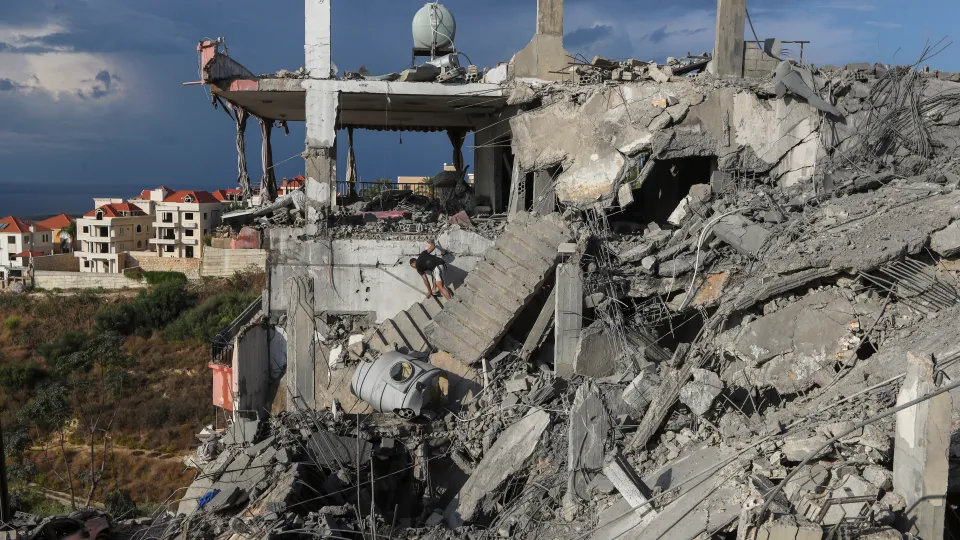The wars in Gaza and Lebanon drag on amid reports about progress in the talks for a political solution and Iranian threats about a retaliatory strike against Israel. In the meantime, the first reports about the costs of rebuilding Lebanon have been published.
While issuing diplomatic statements, the EU’s role has until now mainly been limited to providing humanitarian aid and financial assistance to Palestine, and now also to Lebanon. During her visit to Beirut last May, European Commission President Ursula von der Leyen announced that the EU will provide a financial assistance package for Lebanon worth €1 billion for 2024 to 2027.
“What is at stake is the security of both Lebanon and Israel. The two cannot be disassociated,” she said. "We call for the full implementation of the 2006 UN Security Council Resolution 1701 by all parties.” The 2006 resolution requires Hezbollah to withdraw its troops from southern Lebanon and be replaced by the Lebanese government army. Currently it is too weak to enforce the resolution.
The EU hopes to become a stronger player in solving the conflicts. But besides building an alliance for the two-state solution, the bloc has not launched any initiative which could end the wars. The EU’s foreign policy chief Josep Borrell sees the wars in Gaza and Lebanon as interlinked. It is true but the common denominator is Iran and its “axis of resistance” of proxies – Hamas in Gaza and Hezbollah in Lebanon.
Both are EU-designated terrorist organisations. Hamas has been the de-facto ruler in Gaza but Lebanon has a government, though weak and dysfunctional, which has no interest in an endless war of attrition which will destroy the country. More and more Lebanese, including Shiites, probably do not see Hezbollah as a resistance force defending Lebanon but as a militia working for Iran.
Hezbollah’s role in Lebanon
Hezbollah's disastrous role in Lebanon was clear to all in August 2020 when 2,750 tons of ammonium nitrate exploded in the harbour of Beirut. The explosion killed more than 150 people, wounded at least 5,000, rendered a quarter of a million people homeless and destroyed hospitals and food storages. The ammonium had been stored there by Hezbollah but it was never held accountable.
An Iranian retaliatory attack against Israel could derail the ongoing attempts for a diplomatic solution to the conflict in Lebanon. It would also prompt Israel to respond, even if Iran tries to evade responsibility by using its proxies in Iraq or elsewhere. This time Israel might hit Iran’s oil infrastructure after targeting its air defense in a previous attack.
Asked at a press conference on Monday if the EU or its foreign policy chief has issued any new call to Iran to refrain from a retaliatory attack, the Commission chief spokesperson recalled the EU’s systematic calls to both sides for restraint. The Commission also referred to the conclusions at the latest European Council meeting last month.
In his speech at the recent Paris conference in support of Lebanon’s People and Sovereignty, Borrell outlined several actions for a political solution in Lebanon, among them electing a new president and strengthening the mandate of UNIFIL (the peacekeeping mission in Lebanon). The conference raised $1 billion in pledges for humanitarian aid and military support to help Lebanon become a functioning State.
The EU would have to consider the Iran-armed Hezbollah as its own problem and a threat to both Israel and Lebanon. Without a diplomatic solution, effectively disarming Hezbollah as a militia within the State and enforcing compliance with the agreement, the war between Israel and Hezbollah could continue to drag on and devastate both countries.
Economic scenarios for Lebanon
A recent study by the international aid organisation Mercy Corps, which is working in Lebanon, outlines two potential conflict scenarios and their economic and humanitarian consequences for the country. The report, published by its Lebanon Crisis Analysis Team (LCAT) and part-funded by the EU, highlights the need to end the war before the situation becomes worse.
In the first scenario, LCAT predicts that the war in Lebanon will last at least until the end of January 2025 and the change in US administrations. Under this scenario, Israel continues to target Hezbollah strongholds in southern Lebanon and across the country, without striking key infrastructure or imposing a blockade (besides preventing Iran from resupplying Hezbollah with weapons).
According to LCAT’s regional economic activity analysis, southern Lebanon and the Bekaa Valley contribute approximately 17.5% to Lebanon’s GDP. If key economic sectors slow or come to a halt in these regions until the end of January 2025, Lebanon’s economy would shrink by an estimated 12.8%, equivalent to $2.305 billion.
Furthermore, an estimated 30% of structures south of the Litani River (30 km from the border) may be damaged or destroyed by Israeli strikes. The total cost of building damage compensation would range from $2.8 billion to $3.7 billion. Hezbollah was required to withdraw to the Litani River but instead stored weapons in villages there and dug tunnels in preparation for a cross-border attack.
The worst-case scenario would see the war drag on, with Israel imposing a strict blockade and bombarding vital infrastructure in Lebanon. It might even extend its ground invasion further north. This scenario is hardly likely given that most of Hezbollah’s missiles have been destroyed. But if it came to pass, some 1.5 million people would be forced from Hezbollah-held territory and buildings – including in Beirut – leading to severe intercommunal tensions.
A failed state like Lebanon is not prepared for such a scenario. It could see an economic contraction of up to 21.9% of GDP ($3.938 billion).
LCAT also projects that at least 25% of structures north of the Litani River, stretching as far as the Awali River – areas where Israel has ordered residents to evacuate – could be damaged or destroyed. In total the estimated compensation costs for damaged buildings would amount to between $8.1 to $10.7 billion.


